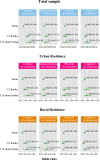Reading, singing, and storytelling: the impact of caregiver-child interaction and child access to books and preschool on early childhood development in Ghana
- PMID: 37612323
- PMCID: PMC10447571
- DOI: 10.1038/s41598-023-38439-5
Reading, singing, and storytelling: the impact of caregiver-child interaction and child access to books and preschool on early childhood development in Ghana
Abstract
Optimal early childhood development (ECD) is crucial in shaping future academic and economic accomplishments. Recognising its profound influence, the United Nations has included a specific target and indicator related to ECD in the Sustainable Development Goals to ensure universal access to high-quality ECD for all preschoolers by 2030. This study investigated whether caregiver-child engagements, early stimulation, and learning opportunities are associated with ECD among children aged 36-59 months. Data on 6752 children were pooled from the 2011 and 2017 Ghana Multiple Indicator Cluster Surveys. The ECD outcomes of interest were literacy-numeracy, social-emotional, learning-cognitive, and physical development, measured with UNICEF's Early Childhood Development Index (ECDI). Binary logistic regression assessed the effects of various caregiver-child engagements and early learning opportunities on the ECD outcomes. We found that most children were developmentally on track in the physical (95.0%) and learning-cognitive (86.4%) domains, but fewer were on track in the literacy-numeracy (36.7%) and social-emotional (68.6%) domains. Reading to or with a child (aOR 1.72; 95% CI 1.35-2.19), telling them stories (aOR 1.61; 95% CI 1.26-2.04), counting or drawing with them (aOR 1.63; 95% CI 1.30-2.04) and a child's attendance at preschool (aOR 4.62; 95% CI 3.34-6.38) were associated with a higher odds for on track literacy-numeracy development. Playing with a child was associated with higher odds of on-track social-emotional development (aOR 1.29; 95% CI 1.04-1.59), physical development (aOR 1.61; 95% CI 1.01-2.55), and learning-cognitive development (aOR 1.51; 95% CI 1.14-2.00). However, singing songs to or with a child (aOR 0.78; 95% CI 0.62-0.89) and taking a child outside the home (aOR 0.78; 95% CI 0.64-0.95) were associated with lower odds for on track social-emotional development. Access to children's books at home was associated with higher odds for on track literacy-numeracy and social-emotional development. In subgroup analysis, some observed associations varied depending on a child's residence (urban or rural). Our findings confirmed that caregiver-child interaction and early learning opportunities could increase a child's likelihood of achieving early developmental milestones.
© 2023. Springer Nature Limited.
Conflict of interest statement
The authors declare no competing interests.
Figures
Similar articles
-
Home environment factors associated with early childhood development in rural areas of Bangladesh: evidence from a national survey.Front Public Health. 2023 Jun 28;11:1209068. doi: 10.3389/fpubh.2023.1209068. eCollection 2023. Front Public Health. 2023. PMID: 37448657 Free PMC article.
-
Early childhood developmental status and its associated factors in Bangladesh: a comparison of two consecutive nationally representative surveys.BMC Public Health. 2023 Apr 12;23(1):687. doi: 10.1186/s12889-023-15617-8. BMC Public Health. 2023. PMID: 37046226 Free PMC article.
-
Early childhood development and its association with maternal parity.Child Care Health Dev. 2023 Jan;49(1):80-89. doi: 10.1111/cch.13011. Epub 2022 Apr 9. Child Care Health Dev. 2023. PMID: 35384014 Free PMC article.
-
Overlooked advantages of interactive book reading in early childhood? A systematic review and research agenda.Acta Psychol (Amst). 2023 Sep;239:103997. doi: 10.1016/j.actpsy.2023.103997. Epub 2023 Aug 8. Acta Psychol (Amst). 2023. PMID: 37562321
-
Care Beyond Newborn Survival Including Child Health and Early Childhood Development; Mental and Psychological Health.Indian J Pediatr. 2023 Dec;90(Suppl 1):37-46. doi: 10.1007/s12098-023-04701-x. Epub 2023 Jul 17. Indian J Pediatr. 2023. PMID: 37458975 Review.
Cited by
-
Global population surpasses eight billion: Are we ready for the next billion?AIMS Public Health. 2023 Oct 25;10(4):849-866. doi: 10.3934/publichealth.2023056. eCollection 2023. AIMS Public Health. 2023. PMID: 38187896 Free PMC article.
-
Effectiveness of a community-led shared book reading intervention in Syrian refugee children: a randomised controlled trial.Sci Rep. 2024 Aug 1;14(1):17822. doi: 10.1038/s41598-024-68903-9. Sci Rep. 2024. PMID: 39090188 Free PMC article. Clinical Trial.
References
-
- McCoy DC, Peet ED, Ezzati M, Danaei G, Black MM, Sudfeld CR, et al. Early childhood developmental status in low- and middle-income countries: National, regional, and global prevalence estimates using predictive modeling. PLoS Med [Internet]. 2016;13(6):1002034. doi: 10.1371/journal.pmed.1002034. - DOI - PMC - PubMed
-
- World Health Organization. Improving early childhood development policies and practices: WHO Guideline [Internet]. Geneva (2020). Available from: https://www.who.int/publications/i/item/97892400020986. - PubMed
-
- National Research Council and Institute of Medicine. From neurons to neighbourhood: science of early childhood development. Shonkoff J., Philips DA, editors pp. 115–119 (National Academy Press, Washington, D.C., 2000).
MeSH terms
LinkOut - more resources
Full Text Sources



